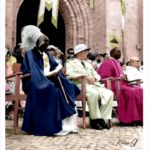The Rwandan State at Rwabugiri’s Death
The political system left by Rwabugiri was extraordinarily complex and flexible. In the most intensively governed areas of the kingdom, batware, banyabutaka, and banyamukenke shared authority, the first collecting ikoro taxes from men according to lineage, the others controlling the usage of land and collecting a return on it. At the will of the Court, the privileges of any one position could be held cumulatively with another, in the same or in another region. The areas of the commands varied greatly in size and were sometimes located in widely separated parts ofthe kingdom. Ibikingi land grants were scattered throughout the holdings of the more powerful notables, allowing the Court to weaken their power and to keep track of local developments. The most important notables needed to be in constant attendance at the Court to defend themselves against possible intrigues by their enemies and so left the local supervision of their holdings to representatives, ibisonga (sing.,igisonga), who might in turn further divide the command among their followers.
Even Rwabugiri did not impose this intensive administration uniformly throughout Rwanda. The biru, the guardians of tradition, controlled domains that paid nothing to the Court and even escaped the reach of the mwami’s justice. In some areas (such as Bukunzi, Busozo, Kingogo, and Bushiru) ritually autonomous leaders, often with renowned powers over the elements and the men under their command, were left undisturbed except for having to acknowledge the mwami’s sovereignty and to pay him a token tribute. Small states or even powerful lineages profited from historical accident, their relative inaccessibility, or the great fighting ability of their men to become direct clients of the Court and so avoid the intermediate control of the notables. In general, rule by the Court was most effective in the heartland and shaded off in the outlying regions, especially in the west and north. In these outer areas the Court ruled only through its batware, who were satisfied with occasionally collecting ikoro by messengers who made rapid forays into the area. No agents of the Court resided permanently in such regions. Beyond these outlying regions, which were eventually encompassed within the twentieth-century boundaries of Rwanda, lay a still more amorphous area where the mwami exerted influence rather than governed. The autonomous rulers of areas now within the boundaries of Uganda and Congo had suffered once or twice from Rwabugiri’s campaigns and sometimes sought to avert further invasions by sending occasional gifts to him.
The central kingdom could be distinguished socially and culturally as well as administratively from the outlying regions. The heartland contained a far larger number of Tutsi, between 10 and 15 percent of the total population. Tutsi eventually held most of the important commands, although several Hutu had been granted great wealth and power by Rwabugiri, and many others served as ibisonga or representatives of more influential notables. Although the Tutsi, especially the most powerful among them, preferred to marry among themselves, many of the people of the central kingdom were of mixed Tutsi-Hutu stock. Indeed the terms “Tutsi” and “Hutu” had come to describe class more than racial origin since wealthy and influential Hutu were absorbed into the aristocracy and poor Tutsi fell into the group of Hutu. Such mobility was usually marked by the marriage of the newly rich or newly poor man with a woman of the class they were entering; the transformation would be fully accomplished one or more generations later when people ceased referring to its having occurred.
The elaborate language and sophisticated art forms of poetry, music, and dance so highly developed at the Court were universally admired and imitated by the people of the central kingdom. In addition, the extension of ubuhake cattle client-ship with its clear distinctions between superior and inferior had influenced people’s behavior. Fear of losing a powerful protector led inferiors to agree with the strong and to comply with their orders even if they found these repugnant. A resourceful client, however, retained a certain freedom: if he chose his words carefully, he could satisfy both his own and his patron’s honor; if he planned his actions carefully, he could achieve his own as well as his patron’s ends. Inferiors often realized the possibilities of turning rivalries among the powerful to their own advantage and often skillfully played one against another.Rwandan reliance on ambiguous language and the employment of ruse later angered more straightforward Europeans. Few were as perceptive as one who remarked that Rwandans saw communication as a “not ignoble contest between two intelligences.”‘
The relatively small number of Tutsi who lived in the outlying regions had moved there in search of pasture for their cattle and in hopes of escaping the demands of the Court and its agents. They remained ethnically and culturally more distinct from the Hutu, yet dealt with them on a basis of greater equality. Distant from Court, they paid less attention to the fine points of culture so much admired by their counterparts in the central kingdom. Local Hutu communities, still concerned primarily with the affairs of their lineages or small states, had developed peculiarities of language and behavior that set those of one region apart from those of another as well as from the people of the heartland. Both the Tutsi and the Hutu of the outlying regions resisted the extension of control by the Court and resented the cultural and social arrogance of the people of the center.
Although variations in administrative arrangements and social and cultural patterns divided the regions, the people of Rwanda shared certain basic ideas about the relations among men and between menand the forces that governed the universe. They understood client-ship arrangements, whether expressed in terms of land or cattle. They accepted the existence of a creative force, imana, which could be made manifest in objects or men. Many of them participated in worship of the Imandwa, a group of spirits said to provide more immediate help in the trials of life than the beneficent but passive imana. Most of them respected the authority of the mwami even as they sought to evade his power. And virtually all of them expressed their ideas in Kinyarwanda, the shared language understood throughout the kingdom despite its regional variations.
https://uk.amateka.net/the-rwandan-state-at-rwabugiris-death/https://uk.amateka.net/wp-content/uploads/2022/11/yuhi-musinga.jpghttps://uk.amateka.net/wp-content/uploads/2022/11/yuhi-musinga-150x150.jpgHistory of kingsThe political system left by Rwabugiri was extraordinarily complex and flexible. In the most intensively governed areas of the kingdom, batware, banyabutaka, and banyamukenke shared authority, the first collecting ikoro taxes from men according to lineage, the others controlling the usage of land and collecting a return on it....BarataBarata rpierre@ikaze.netAdministratorAMATEKA | HISTORY OF RWANDA




